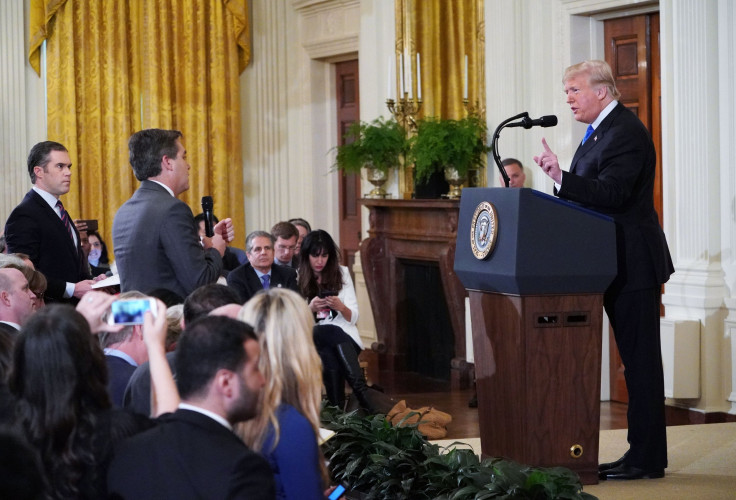CNN’s Case Against White House Revoking Jim Acosta's Access: The Legal Argument

CNN filed a lawsuit against the White House in the district court in Washington on Tuesday, for unlawfully revoking the press pass of the network’s reporter, Jim Acosta, following a heated argument with President Donald Trump during a press briefing on Nov. 7.
“The wrongful revocation of these credentials violates CNN and Acosta’s First Amendment rights of freedom of the press, and their Fifth Amendment rights to due process,” CNN said in a statement. “If left unchallenged, the actions of the White House would create a dangerous chilling effect for any journalist who covers our elected officials.”
Apart from the First and Fifth Amendments, the Secret Service in the White House also allegedly violated the Administrative Procedure Act, which required “fair administrative procedure” to be followed by all branches of the federal government while issuing regulations. CNN argued the actions of the Secret Service while revoking Acosta’s hard pass were "arbitrary and capricious," which violated the act, Axios reported.
Possible First Amendment violation
A reporter or a news outlet is not granted the constitutional right to access the White House and the president of the United States does have the right to prefer one network over the other or decide which journalists to meet with privately. However, once the White House has granted access to all accredited reporters with press passes in a “limited-purpose public forum,” for instance in a briefing or a press conference, the First Amendment which protects free speech goes into effect, wrote Noah Feldman, a Harvard University law professor and a former clerk to U.S. Supreme Court Justice David Souter, in an op-ed for Bloomberg.
In such a scenario, neither the president nor members of his administration can discriminate against reporters just because they don’t like their viewpoint.
Such a precedent was also upheld by a 1977 ruling in the case of Sherrill v. Knight. The U.S. Court of Appeals for the D.C. Circuit said a reporter’s press pass cannot be revoked without the administration giving a proper reasoning for its action.
“White House press facilities having been made publicly available as a source of information for newsmen, the protection afforded newsgathering under the First Amendment guarantee of freedom of the press requires that this access not be denied arbitrarily or for less than compelling reasons,” the ruling established.
The carefully worded ruling could pose a problem for the White House’s defense as the administration never really gave a single substantial reason for yanking Acosta’s press pass. He was initially painted as a security threat by the administration, for which they cited a doctored video of the press briefing. The original clip of the event showed Acosta merely holding on to the microphone as a White House intern tried to take it away.
On Tuesday, the White House changed its stance and complained that Acosta’s refusal to return the microphone was “neither appropriate nor professional” as it prevented other reporters from asking questions.
Nathan Siegel, a First Amendment lawyer with the firm Davis Wright Tremaine and former in-house counsel for ABC, told Politico: “The fact that the defendants’ explanation shifts is often evidence that it’s a pretext for the real reason.”
Possible Fifth Amendment violation
CNN’s lawsuit said Acosta wasn’t officially notified of the White House’s intention to revoke his press pass prior to the administration’s decision. Since he also did not receive any concrete reason as to why such a decision had been made, it did not give him enough time to appeal the decision.
As such, the White House’s actions were in violation of due process and fair judicial process that is guaranteed by the Fifth Amendment before a person is deprived of “life, liberty, or property.”
Possible federal code violation
In addition, a number of legal experts have opined that CNN might have an upper hand in the case against the Trump administration. Fox News senior judicial analyst Judge Andrew Napolitano said during a segment on Fox Business: “I think CNN got a very good case. I think this will be resolved quickly. I don’t expect a jury trial.”
He also referenced to Code of Federal Regulation (CFR) Section 409.1 which provided a guideline for the revocation of a reporter’s White House press pass.
According to CFR: “The In granting or denying a request for a security clearance made in response to an application for a White House press pass, officials of the Secret Service will be guided solely by the principle of whether the applicant presents a potential source of physical danger to the President and/or the family of the President so serious as to justify his or her exclusion from White House press privileges.”
Based on the law, Napolitano defended Acosta’s actions, Eyewitness News reported. “Acosta may have been an irritant to the president, but he was hardly a danger to [Trump],” he said.
White House’s stance
White House Press Secretary Sarah Sanders characterized the move by CNN as “grandstanding.”
“We have been advised that CNN has filed a complaint challenging the suspension of Jim Acosta’s hard pass. This is just more grandstanding from CNN, and we will vigorously defend against this lawsuit,” Sanders said in a statement. “CNN, who has nearly 50 additional hard pass holders, and Mr. Acosta is no more or less special than any other media outlet or reporter with respect to the First Amendment.”
Apart from Sander’s brief statement, White House’s stance in the case is unclear. The administration has not yet filed any official response to the lawsuit.

© Copyright IBTimes 2025. All rights reserved.






















